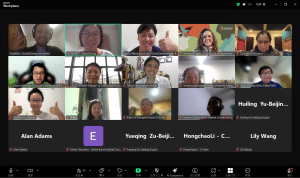China’s 20th Party Congress called to optimize population policy and establish fertility support systems. New measures provide economic incentives, leave, childcare and women’s rights protections to encourage childbearing. However, a narrow focus on families and specialized institutions ignores community roles and the socio-cultural nature of reproduction.
Most policies target families with material incentives, reinforcing parental duties. But humans have long relied on community support for childrearing. An economic rationale presumes lowering costs and raising benefits spurs fertility, ignoring cultural factors. Targeted institutions like employers and childcare centers overlook communities’ integrated, continuous impact on nurturing and childcare.
Socio-cultural history shows reproduction involves human continuity and social needs beyond biology or economy. Pregnancy and parenting trigger needs for companionship, identity shifts, attention and purpose. Communities once met these through rituals, celebrations and gifts, but urbanization and privatization left women “socially isolated”. Parenting responsibilities shifted to fragile nuclear families, straining intimate relationships. Businesses exploit unmet social needs, creating new problems.
Some studies view institutional motherhood as oppressive, but others note tensions with lived experiences called “mothering practices”. Institutional motherhood isolates and denies women’s diversity, but mothering practices are dynamic, informed by women’s experiences. The “paradox of motherhood” is they interact, as institutional pressures shape and are shaped by life changes raising new challenges in “being a mother”. Women’s strategies loosen static notions of motherhood.
Recent research shows mobile, middle-class and entrepreneurial mothers’ diverse pregnancy, childbirth and parenting practices. These include: producing knowledge, understanding their bodies, mobilizing others to parent, growing through parenting, and gaining life power and purpose. This provides insights into motherhood as empowering, not just oppressive. The key is building environments where women receive support to develop their subjectivity in mothering — involving others in childrearing; balancing life roles; seeing self-awareness and purpose beyond motherhood; and using mothering to change society.
Most research examines family or institutions, neglecting communities enabling social reproduction – the care sustaining and recreating life. This care is relational, emotional and physical, not instrumental or standardized. Community transcends nuclear families’ privacy and involves flexible, open interactions unlike specialized institutions. Community escape privatized family life’s narrowness, enabling social participation.
In summary, policy should move beyond material incentives for private families and specialized institutions. Acknowledging the socio-cultural, empowering and communal aspects of reproduction calls for optimizing community support. Providing inclusive environments where women gain purpose and connection during mothering, not isolation, yields benefits beyond fertility rates alone – a shared vision of the good life, dignity and humanity in care for future generations. With compassion for these silent anchors of continuity, society inches closer to building a system as enlightened as the future it seeks to shape.



